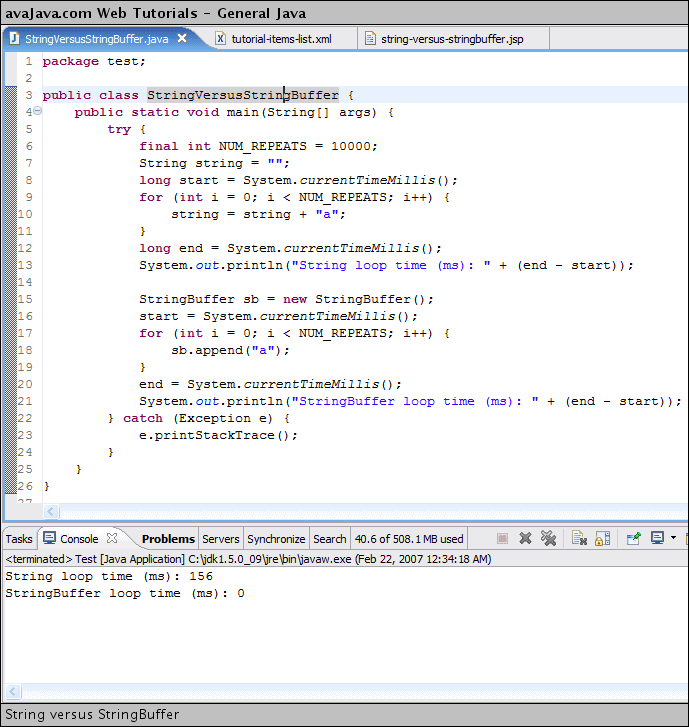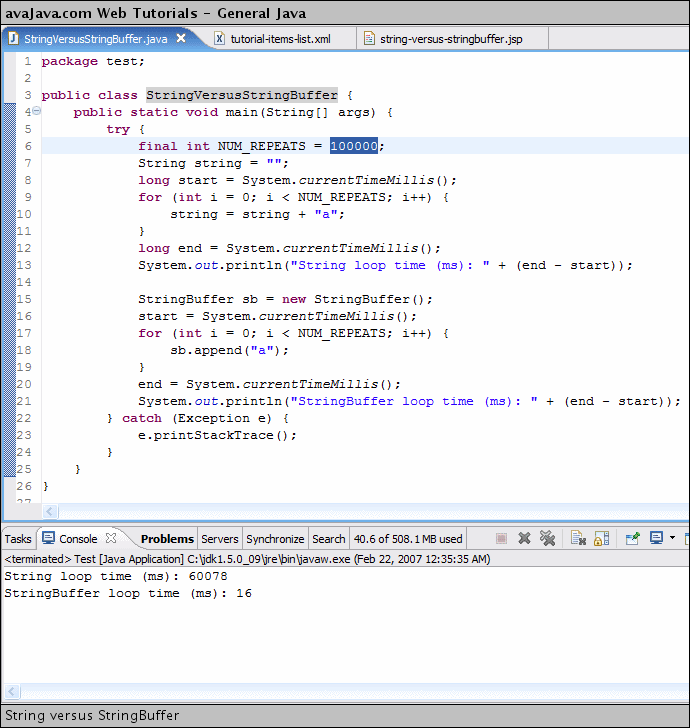|
String versus StringBuffer
Author: Deron Eriksson
Description: This Java tutorial compares Strings and StringBuffers.
Tutorial created using:
Windows XP || JDK 1.5.0_09 || Eclipse Web Tools Platform 1.5.1
An understanding of the difference between JavaSW Strings and StringBuffers can lead to great performance increases. Although it may seem not to be the case given Java's String concatenation syntax (like a=a+"hi"), Strings are in actuality read-only (ie, immutableW) after they are created so that they cannot change. As a result of this, when you concatenate Strings via the + operator, in the background a temporary StringBuffer gets created and the toString method is called on the StringBuffer to create the new String, and this operation is fairly time-consuming. However, much less overhead is required to concatenate a String onto a StringBuffer object via the StringBuffer append method. You can basically think of each append as adding another String piece into a linked list that makes up the StringBuffer. So you basically have a StringBuffer consisting of a String chunk which then points to another String chunk which points to another String chunk, etc... The benefits of StringBuffer become clear when you have a situation involving many concatenations. To illustrate this, let's try concatenating 10,000 "a" Strings together via the String + operator and via a StringBuffer append method and monitor the time required to perform these operations. The StringVersusStringBuffer class below illustrates this. StringVersusStringBuffer.javapackage test; public class StringVersusStringBuffer { public static void main(String[] args) { try { final int NUM_REPEATS = 10000; String string = ""; long start = System.currentTimeMillis(); for (int i = 0; i < NUM_REPEATS; i++) { string = string + "a"; } long end = System.currentTimeMillis(); System.out.println("String loop time (ms): " + (end - start)); StringBuffer sb = new StringBuffer(); start = System.currentTimeMillis(); for (int i = 0; i < NUM_REPEATS; i++) { sb.append("a"); } end = System.currentTimeMillis(); System.out.println("StringBuffer loop time (ms): " + (end - start)); } catch (Exception e) { e.printStackTrace(); } } } On my dual core Intel 1663 Mhz HP Pavilion laptop, I obtained the following result when I executed the StringVersusStringBuffer class: 
The String + operator concatenation took 156 milliseconds to concatenate 10,000 "a"s, while the StringBuffer append concatenation took less than 0 milliseconds! Let's try this same test, but this time increase the number of concatenations to 100,000. 
To concatenate 100,000 "a"s via the String + operator took 60,078 milliseconds (an entire minute), while the StringBuffer append concatentations took a mere 16 milliseconds! So, if you find yourself performing multiple String concatenations, you may want to consider using a StringBuffer rather than the String + concatenations. |

